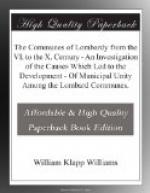These rural divisions seem sometimes to have been called sculdascia, for we have a diploma of Berengar I., of the year 918, given to the monastery of Sta. Maria dell’ Organo,[51] where is mentioned “pratum juris imperii nostri pertinens de Comitatu Veronensi, de Sculdascia videlicet, que Fluvium dicitur”; and in a document published by Ughelli,[52] in speaking of the bishops of Belluno, “Sculdascia Belluni” is used. In Frankish times the centenarius held the same position as the sculdahis of the Lombards: his jurisdiction was similarly limited to minor offences; all cases involving capital punishment, loss of liberty, or delivering of res mancipii, being handed over to the count’s court according to the legislation of Charlemagne.[53] The decani and saltarii were subordinates of the centenarii and sculdahis. They both presided over smaller local divisions than the sculdascia, and acted as deputies. In the laws of Liutprand,[54] speaking of a runaway slave, we are told that “si in alia judiciaria inventus fuerit, tunc decanus aut saltarius, qui in loco ordinatus fuerit, comprehendere eum debeat et ad sculdahis suum perducat, et ipse sculdahis judici suo consignet.” The saltarius seems to have been originally a sort of guardian of forests, “custos saltuum"[55] or “silvanus";[56] and the name of the decanus, like the Frankish centenarius, is a survival of the old decimal division of the army and people. These minor officers, as well as other subalterns of the judex, are often met with under the common name of actionarii, which includes also the different sorts of exactores, adores, advocati, and all the lesser officials of the fiscus.
In the course of this investigation I have already referred to, and in a certain measure characterized, the changes introduced into the Lombard system of government consequent on the kingdom being absorbed into the great empire of Charlemagne. I have said that, owing to the similarity of institutions between the Franks and the Lombards, the changes made consisted rather in differences in the manner of enforcing the control of the central power than in any alteration in the institutional life of the people, but that there were certain exceptions to this general rule, which, in their mode of operation, though not in the intention of their author, materially affected, indeed greatly accelerated, the growth of individual life among the cities. We must now consider the nature of these exceptions.




